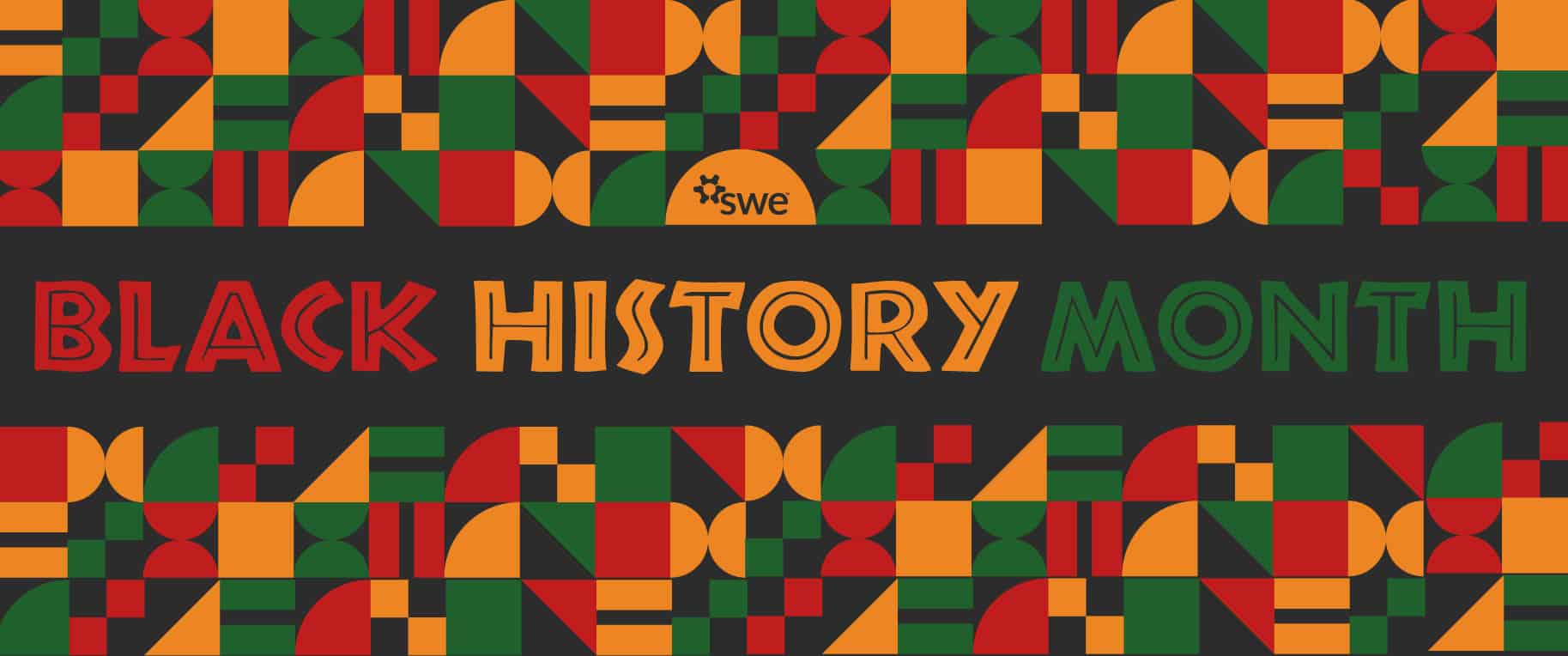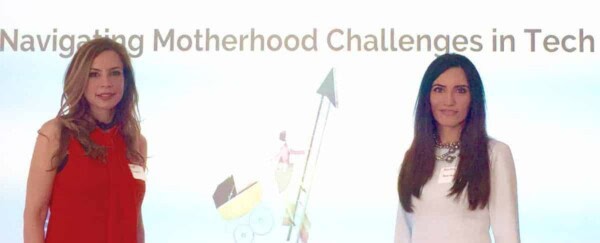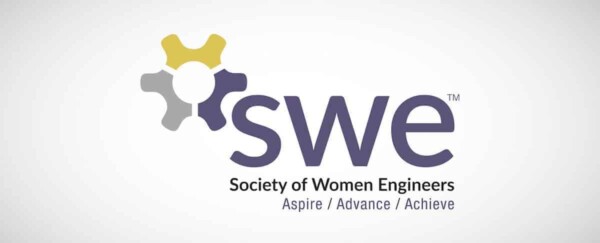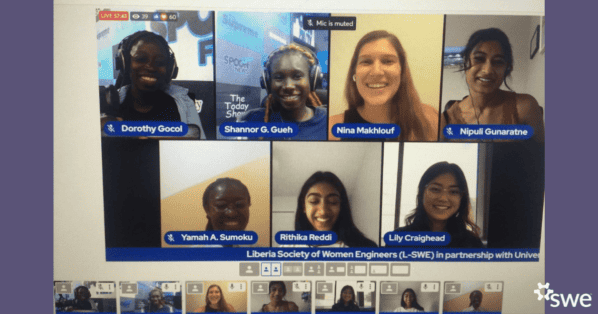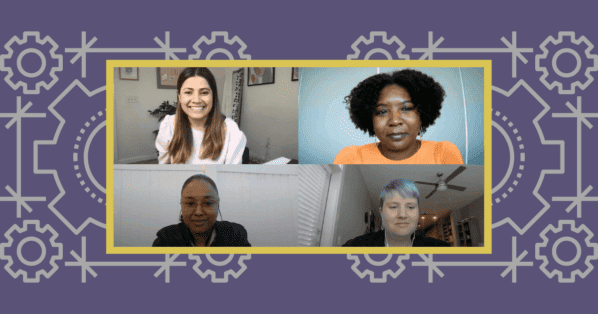




Georgianna Yvonne Young Clark, P. E. and SWE Fellow
(April 13, 1929 – January 27, 2019), affectionately known as “Y. Y.” and “TSU’s First Lady of Engineering”, led a life filled with firsts:
- First woman to receive a mechanical engineering degree from Howard University (1951)
- First African American woman engineer hired at Frankford Arsenal Gage Lab (1951)
- First African American member of the Society of Women Engineers (1952)
- First African American woman engineer hired at Radio Corporation of America (RCA) in the electronic tubes division (1954)
- First woman engineer hired as an instructor at Tennessee State University (TSU) (1955)
- Inspired SWE’s public anti-segregationist stance at the annual conference in Houston, TX to enable Y.Y.’s full participation (1957) [Forty years later (1997), SWE held another annual conference in Houston, TX where Y. Y. received an apology for her treatment in 1957, a plaque, and a key to the city. At that same conference, Professor Clark was honored as SWE’s Distinguished Engineering Educator.]
- Earned her Professional Engineer (P. E.) license (1960)
- Worked summers as an aerospace engineer at NASA Marshall Space Flight Center where she resolved Saturn V rocket booster engines’ hot spot issues (1960s)
- First woman appointed Department Head of the TSU Mechanical Engineering Department and served this capacity for two terms and a total of 11 years
- Worked summers at NASA Houston (Johnson Space Flight Center) developing the moon rock samples container that Neil Armstrong used to transport rocks back to Earth
- First African American woman engineer hired at the Ford Motor Company Glass Plant (Nashville) (1971)
- First woman to graduate from Vanderbilt University with a M.S. degree in engineering management (1972)
- Featured in an article about women in engineering in the July 1973 issue of Mechanical Engineering magazine
- And so much more…
Yvonne Clark was passionate about fixing things throughout her childhood but was prohibited from taking a mechanical drawing class in high school because she was a woman. She instead took an aeronautics course and joined the Civil Air Patrol becoming the squad leader. She was inspired to fly by family friends who were Black pilots based at Godman Army Airfield. One of these pilots, Jimmy Lundsford, took young Yvonne and her mother, Hortense Houston Young, flying and let Yvonne take control once they were in the air. She came of age during World War II with a strong sense of patriotism. She wanted to ferry U. S. bombers to Europe and this led to her desire for a career in Mechanical Engineering.
She graduated from high school in 1945 at the age of 16. After high school, she studied at the Latin School for Girls in Boston for a year and then at Roxbury Memorial High School For Girls before enrolling in college. While in Boston, Y. Y. lived with Colonel Snowden and his family who were also friends of her family.
She was awarded a full scholarship to the University of Louisville in 1947 but when the university realized she was African American, they rescinded the offer based upon the school’s segregation policy. Threatened with litigation, the University of Louisville and the Commonwealth of Kentucky paid for Clark to attend Howard University.
Yvonne Young Clark excelled and graduated with honors. She was the first woman to earn a Bachelor of Science in Mechanical Engineering degree at Howard University. Most of her classmates were veterans who had served in World War II. Her roommate was a liberal arts major and had been a cheerleader in high school. The roommate (Janet) convinced Y. Y. to go to tryouts with her. Y. Y. made the Howard cheerleading squad, even though in her words “And I had never cheered in front of anybody (laughs) in my life.”
Due to the sexism of the day, she was not allowed to march in her 1951 engineering graduating class of 300 and instead received her diploma in the office of the university president. During her senior year at Howard University, Y. Y. interviewed for jobs but recruiters from multiple companies made it clear they would not hire women. She persisted in her job search and went to work for Frankford Arsenal Gauge Labs in Philadelphia then to Radio Corporation of America (RCA) in Montclair, NJ where she designed electrical equipment with 18 colleagues, all men.
The year after she graduated from Howard University, Y. Y. joined the Society of Women Engineers (SWE) becoming the Society’s first African American Member. She was very active in SWE and served in many capacities including as a member of the Executive Committee, predecessor to the Board of Directors. Y. Y. became the center of the 1957 SWE annual convention (now the annual conference) when it was held in Houston, TX.
Convention organizers had informed the hotel that SWE was racially integrated and had been assured that Y.Y. would be welcome. Upon her arrival, she was denied a hotel room and entrance to the convention. SWE threatened to pull the event but Y. Y. insisted it be held. A compromise was reached such that Y. Y. would lodge with an aunt and uncle in Houston and be allowed to attend the convention as long as she was escorted by other SWE members at all times. Y. Y. accompanied anyone who needed to go anywhere in the hotel making her presence very visible. SWE adopted a policy to not hold conventions (now conferences) in the U.S. South until civil rights laws were passed to ensure that all members would be welcomed and protected.


Yvonne Clark participated in the first International Conference of Women Engineers and Scientists (ICWES) held in New York City in June 1964 and organized by the Society of Women Engineers. Professor Clark participated in other SWE conferences and actively participated in the Society. In addition to serving on the SWE Executive Committee (predecessor of the Board of Directors), Y. Y. was elected as a SWE Fellow in 1984, and was a SWE Lifetime Member.


In addition to SWE, Y. Y. Clark was active in the American Society of Mechanical Engineers (ASME), Tennessee Society of Professional Engineers, the American Society of Engineering Education (ASEE), and the American Society of Heating, Refrigerating, and Air-Conditioning Engineers (ASHRAE). She chartered student chapters for SWE, ASME, and ASHRAE at TSU. Professor Clark was a licensed Professional Engineer (P. E.). She was a charter member of the first Tennessee chapter of the mechanical engineering honor society, Pi Tau Sigma – Alpha Delta Chapter and was the Tennessee State University link for the “Order of the Engineer”.
Yvonne Young Clark received numerous awards throughout her lifetime including Women of Color Technology Award for Educational Leadership by U.S. Black Engineers, Distinguished Service Award by the Tennessee Society of Professional Engineers, President’s Distinguished University Award from TSU, and Mechanism of the Year Award given by the TSU student chapter of ASME.
In a 2006 interview for Sisters in Science : Conversations with Black Women Scientists about Race, Gender, and Their Passion for Science written by Diann Jordan, Purdue University Press, Y. Y. is asked “What can we do as Black Women to change our invisibility and image in science? How do we become more visible?” Professor Clark, with her 50+ years’ career as basis responds:
“I think we have to be active participants in our professions at all levels. We have to be proactive: network and participate in organizations which are outside our science professions but which allow us to impact others. We can’t sit and wait or allow another person’s perception of us to deter us from our goals. As I mentioned earlier, I never allowed anyone else’s problems to be mine.”
A follow-up question was: “Do you think professional organizations have a particular role in promoting the visibility of Black Women in science? If so, what do you think that role should be and why?” Professor Clark responds:
“Yes, it allows us to develop sensitivity/awareness to racial and gender issues at decision-making levels. Additionally, it allows us to model our expertise and leadership skills and act in supportive ways.”
In another interview for StoryCorps in 2007, Y. Y. Clark told her daughter Carol Lawson:
And mom and dad, if I wanted engineering—they didn’t put obstacles in front of me. They said, If you want it, you will it.
Georgianna Yvonne Young Clark lived a life full of firsts but she was determined she wouldn’t be the last. She was the TSU freshmen advisor for decades, inspiring thousands of students to succeed in engineering careers. She went to local primary and secondary schools, talking to students about engineering. Shortly after her death, the Tennessee State Legislature passed House Joint Resolution 208 in honor of her memory. One statement in particular stands out:
WHEREAS, Y. Y. Clark leaves behind an indelible legacy of integrity and probity in public life, compassion and loyalty in private life, and diligence and dedication in all her chosen endeavors.
Source Materials:
Photos 1-4: https://www.findagrave.com/memorial/196418477/georgianna-yvonne-clark
https://alltogether.swe.org/2021/01/swe-senate-rise-sub-team/
Photo 6: http://reuther.wayne.edu/node/238
Photo 7: https://alltogether.swe.org/2018/03/celebrating-black-history-month-yvonne-young-clark/
Photos 8 and 9: Jet Magazine: https://books.google.com/books?id=YrEDAAAAMBAJ&pg=PA48&dq=yvonne+young+clark&ei=k7j-S7flFZbCzQSEt-yTDQ&cd=3#v=onepage&q&f=false
StoryCorps Interview October 26, 2007 conducted by Carol Lawson and Yvonne Young Clark: https://ethw.org/Oral-History:Yvonne_Young_Clark_and_Carol_Lawson
Professional associations: https://www.prdistribution.com/news/nashvilles-own-hidden-figure-mrs-yvonne-y-clark-pe-dies-at-the-age-of-89.html
https://www.blackpast.org/african-american-history/yvonne-young-clark-1929-2019/
Sisters in science : conversations with black women scientists about race, gender, and their passion for science https://archive.org/details/sistersinscience0000unse/page/58/mode/2up
Tennessee State House Joint Resolution: https://www.capitol.tn.gov/Bills/111/Bill/HJR0208.pdf
Authors
-

SWE Blog provides up-to-date information and news about the Society and how our members are making a difference every day. You’ll find stories about SWE members, engineering, technology, and other STEM-related topics.
-

Karen Ramsey-Idem, PhD, is an FY22 Director on the Society of Women Engineers BOD. She is a SWE African American Affinity Group volunteer. Karen works for Cummins Inc. leading the Global Technical Operations Excellence Organization and is a passionate champion for diversity, equity, inclusion, and belonging.

